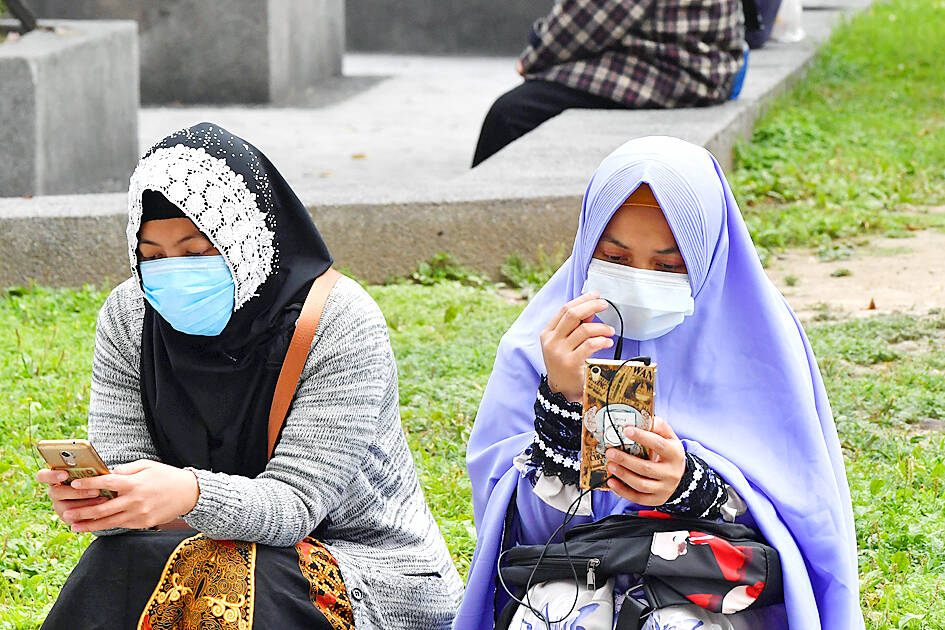Nearly 30 percent of migrant workers in Taiwan have been targeted by financial fraud, with each person losing an average of NT$7,995, a survey released on Thursday by Taipei Fubon Bank and non-governmental organization One-Forty showed.
The survey was conducted in June and July among migrant workers from Indonesia, Vietnam, the Philippines and Thailand in 21 administrative regions, garnering 564 valid responses, One-Forty cofounder Kevin Chen (陳凱翔) said.
Among the respondents, 27 percent said that they had been scammed while working in Taiwan, with 15 percent among those defrauded more than twice, the survey showed.

Photo: CNA
Workers lost an average of NT$7,995, it showed.
That is a significant amount of money, because the average monthly salary of the respondents was NT$24,280, Chen said.
The three most common fraud schemes were people pretending to be friends or family needing to borrow money (15.7 percent), false money transfer services (11.7 percent) and fake online shopping Web sites (10.6 percent), the survey showed.
Migrant workers were most likely to be scammed by fake money transfer services during holidays when remittance services are closed or when a their residency was being renewed, Chen said.
One-Forty was told of an incident involving an Indonesian worker who has lived in Taiwan for 10 years and lost NT$30,000 after being duped by a fake advertisement on Facebook about a money transfer service that would not require him to present identification documents, Chen said.
One out of every 10 migrant caregivers had witnessed their care recipient being scammed, he said, citing the survey.
Educating the 240,000 migrant caregivers working in Taiwan would help prevent at least 20,000 elderly Taiwanese from being defrauded, he said.
About 90 percent of respondents wanted to learn how to manage their money and become more financially independent, the survey showed.
The areas migrant workers wanted to focus on were forming good buying habits, creating a long-term personal finance plan and setting saving goals, it showed.
One-Forty plans to develop a series of online and in-person courses and a Chinese-Indonesian bilingual tabletop game that migrant caregivers can play with care recipients so they can learn how to better manage and safeguard their savings, Chen said.

A preclearance service to facilitate entry for people traveling to select airports in Japan would be available from Thursday next week to Feb. 25 at Taiwan Taoyuan International Airport, Taoyuan International Airport Corp (TIAC) said on Tuesday. The service was first made available to Taiwanese travelers throughout the winter vacation of 2024 and during the Lunar New Year holiday. In addition to flights to the Japanese cities of Hakodate, Asahikawa, Akita, Sendai, Niigata, Okayama, Takamatsu, Kumamoto and Kagoshima, the service would be available to travelers to Kobe and Oita. The service can be accessed by passengers of 15 flight routes operated by

Chinese spouse and influencer Guan Guan’s (關關) residency permit has been revoked for repeatedly posting pro-China videos that threaten national security, the National Immigration Agency confirmed today. Guan Guan has said many controversial statements in her videos posted to Douyin (抖音), including “the red flag will soon be painted all over Taiwan” and “Taiwan is an inseparable part of China,” and expressing hope for expedited reunification. The agency last year received multiple reports alleging that Guan Guan had advocated for armed reunification. After verifying the reports, the agency last month issued a notice requiring her to appear and explain her actions. Guan

GIVE AND TAKE: Blood demand continues to rise each year, while fewer young donors are available due to the nation’s falling birthrate, a doctor said Blood donors can redeem points earned from donations to obtain limited edition Formosan black bear travel mugs, the Kaohsiung Blood Center said yesterday, as it announced a goal of stocking 20,000 units of blood prior to the Lunar New Year. The last month of the lunar year is National Blood Donation Month, when local centers seek to stockpile blood for use during the Lunar New Year holiday. The blood demand in southern Taiwan — including Tainan and Kaohsiung, as well as Chiayi, Pingtung, Penghu and Taitung counties — is about 2,000 units per day, the center said. The donation campaign aims to boost

The Central Weather Administration (CWA) said a magnitude 4.9 earthquake that struck off the coast of eastern Taiwan yesterday was an independent event and part of a stress-adjustment process. The earthquake occurred at 4:47pm, with its epicenter at sea about 45.4km south of Yilan County Hall at a depth of 5.9km, the CWA said. The quake's intensity, which gauges the actual effects of a temblor, was highest in several townships in Yilan and neighboring Hualien County, where it measured 4 on Taiwan's seven-tier intensity scale, the CWA said. Lin Po-yu (林柏佑), a division chief at the CWA's Seismological Center, told a news conference